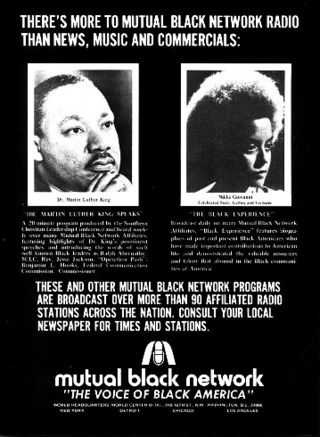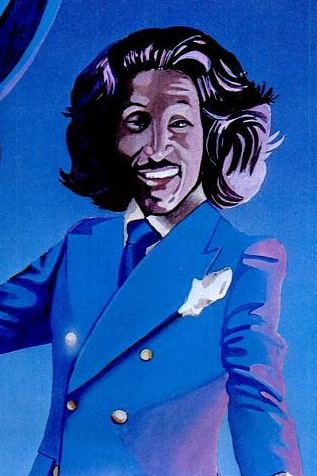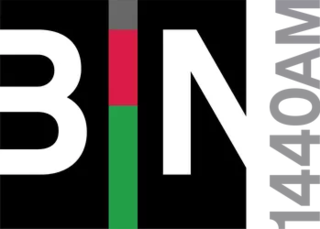
The Mutual Broadcasting System was an American commercial radio network in operation from 1934 to 1999. In the golden age of U.S. radio drama, Mutual was best known as the original network home of The Lone Ranger and The Adventures of Superman and as the long-time radio residence of The Shadow. For many years, it was a national broadcaster for Major League Baseball, the National Football League, and Notre Dame Fighting Irish football. Mutual ran a highly regarded news service along with a variety of well-liked commentary shows from the middle of the 1930s until the network's dissolution in 1999. In the 1970s, Mutual pioneered the nationwide late night call-in talk radio program, introducing the country to Larry King and later, Jim Bohannon.

Mark Riley is an American journalist and commentator. He is the former host/presenter of WWRL 1600 AM's morning drive talk program. He hosted a four-hour evening news, interview, comment, and culture program, "The Air Americans," on the now-defunct liberal talk radio network Air America Radio. His work at Air America also included co-hosting the network's morning-drive show, "Morning Sedition" with stand-up comic Marc Maron.

American Urban Radio Networks (AURN) is the only African-American-owned-and-operated Nielsen RADAR-rated radio network in the United States.

The Mutual Black Network (MBN) was founded by the Mutual Broadcasting System in 1972 as the first national full-service radio network aimed at African Americans; it was initially branded as Mutual Reports before the branding change to MBN. With 98 affiliated stations across the United States, including flagship WNJR in New York, the network broadcast an hourly five-minute newscast at 50 minutes past the hour. It also aired sports and feature programs, and for one year beginning in the spring of 1974, a 15-minute daily soap opera called Sounds Of The City.

Frankie "Hollywood" Crocker was an American disc jockey, VH-1 VJ, TV host and actor. Crocker helped grow WBLS, the urban adult contemporary and black music radio station, into the #1 station in New York City in the late 1970s.

WLIB is an urban contemporary gospel radio station licensed to New York, New York. WLIB is owned by the Emmis Corporation, along with sister stations WBLS and WQHT. The three stations share studios in the Hudson Square neighborhood of lower Manhattan, and WLIB's transmitter is located in Lyndhurst, New Jersey.
WWRL is a commercial radio station licensed to New York, New York. WWRL airs an all-news radio format as an affiliate of the Black Information Network (BIN). The station is owned by iHeartMedia, Inc.

WVON is a radio station serving the Chicago market, which airs an African-American-oriented talk format. WVON is operated by Midway Broadcasting Corporation via a local marketing agreement with frequency owner iHeartMedia.

WGRB is a commercial AM radio station in Chicago. It is owned by iHeartMedia and it airs an urban gospel format. On Sundays, the station broadcasts the services of several African-American churches in the area. The studios are at the Illinois Center complex on Michigan Avenue in Downtown Chicago.

KATZ is an commercial AM radio station in St. Louis, Missouri. It airs an urban gospel radio format and is owned by iHeartMedia, Inc. The studios are on Foundry Way near Interstate 64 in St. Louis.

WGVL is a radio station licensed to Greenville, South Carolina. It is owned and operated by iHeartMedia, Inc. The station serves as Greenville's Black Information Network affiliate.
Vince Sanders is a veteran of the broadcast industry having spent nearly 40 years on the job. He has written two books, both titles dedicated to his years behind the microphone or on the stage as an actor: Can't Get HERE from THERE and That's Not Funny! Sanders began his broadcast career as an on-air talent at WBEE-AM in Chicago in 1958. He retired in 1995 as vice president and general manager of station WWRL-AM in New York City. Simultaneously, he was Vice President of Broadcast Operations at the National Black Network (NBN). WWRL and NBN were owned by the same company. Sanders won the Gabriel Award in 1972 while an anchor/reporter for NBC (WMAQ) news, a position he held from 1971 until 1973. This followed his achievement of the same award in 1963 while working with the Chicago Centennial Authority.
Imhotep Gary Byrd is an American, New York City–based radio talk show host and executive producer, radio DJ, poet, songwriter, music recording artist and producer, rapper, writer and community advocate/activist. Byrd began his career as a radio DJ in Buffalo at age 15. In 2015, he celebrated 50 years as a radio personality. For over 30 years, he’s been a talk show host at WBLS and WLIB radio in New York City.
WRAP was an historic radio call sign, that was transferred, along with a black-oriented format, between three Hampton Roads stations from 1952 until 1989. WRAP began as one of only a handful of American radio stations broadcasting full-time to the African American community, featuring R&B, soul music and black gospel, along with news and talk programs. Communities that were served included Portsmouth, Newport News, Hampton and Virginia Beach.
Joseph Deighton Gibson Jr. was an American radio disc jockey and actor. He attended Lincoln University in Jefferson City, Missouri, from 1940 to 1942, earning a bachelor's degree in science. He is regarded as the father of the Black appeal radio format.
Ed ‘Eddie’ Castleberry (1928–2009) was a pioneering newscaster, columnist and air personality at the Mutual Black Network, which produced 5-minute news spots that were broadcast on affiliated radio stations, MBN was later taken over by rival Sheridan Broadcasting Company in 1978 and by 1990 SBN had over 150 affiliates and grossed $15 million annually.
WQQW was a radio station on 1590 AM in Waterbury, Connecticut, operating between 1934 and 1992. During this time it changed hands several times. In 1996 it was acquired by the Unity Broadcasting Corporation, owner of WWRL, which surrendered the license.
Roy Norris Wood Sr. was an African American radio pioneer, civil rights journalist, commentator, college professor, and entrepreneur. Wood was the host of the nationally syndicated TV show Black's View on the News. He was a co-founder of the National Black Network, one of the first broadcast networks to produce programming specifically for African Americans.
Black Information Network (BIN) is a radio network and content brand owned by iHeartMedia. Launched on June 30, 2020, it is an all-news radio network of stations targeting African American communities, carrying mostly important national news headline stories as well as current events and special interest features. Some stations also incorporate local news, traffic, weather and sports updates into the network feed. Tony Coles is the network's president and Tanita Myers is the news director.








